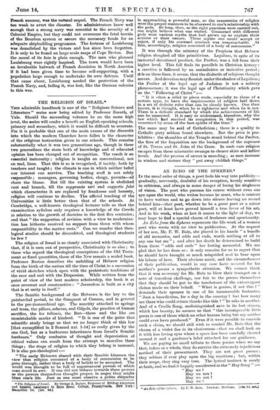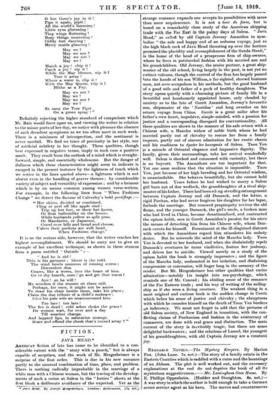AN ECHO OF THE SPHERES,* In the usual order of
things, a poet feels his way into publicity— gradually, nervously, doubtful of his reception, keenly sensitive to criticism, and always in some danger of losing his singleness of vision. The poet who pursues his course without even one eye upon the world, who writes because he must, who is content to have written and to go down into silence leaving no record behind him—that poet, whether ho be a great poet or a minor poet, will at least have proved himself a true lover of his art, And in his work, when at last it comes to the light of day, we may hope to find a special charm of freshness and spontaneity. An Echo from the Spheres represents the life-work of a woman poet who wrote with no view to publication. At the request of her son, Mr. F. W. Bain, she placed in his hands "a bundle of old memories, and odds and ends, worth nothing at all to any one but me " ; and after her death he determined to build front these "odds and ends" her lasting memorial. We are glad that he has done so : it only remains for us to regret that he should have brought so much misguided zeal to bear upon his labour of love. Their obvious merit, and the cireumetances of their publication, would in any case have secured for his mother's poems a sympathetic attention. We cannot think that it was necessary for Mr. Bain to blow their trumpet on a note of truculent challenge, nor fair to the poems themselves that they should be put to the touchstone of the extravagant claims made on their behalf. "What is genius, if not this ? " demands their sponsor in one of his innumerable footnotes. "Just a benediction, for a day in the country I but how many are there who could return thanks like this ? "he asks in another. And of a Cradle Song, undistinguished save in its last stanza, which has beauty, be assures us that "this incomparable little poem is one of those which no other human being hot my mother could ever have produced." Even If it were possible to concede such a claim, we should still wish to remind Mr. Bain that the charm of a violet lies in its elusiveness—that we shall look on it with less loving eyes where a space has been carefully cleared around it and a gardener's label attached for our guidance. We are paying no small tribute to these poems when we say that, taken as a whole, they do survive the extremely injudicious method of their presentment. They are not great poems : they seldom if ever play upon the big emotions ; but, within their scope, they ring very true. The lyrical instinct is rarely at fault, and we find it happily manifested in the" May Song" "May we 1 May we not May we not May we ?
• An Echo 0 the Sphere, By P. w. Baal. London : 3lethueo. 110e, 64. oet.l
0 but 'there's joy in it ! Pipe it again, pipit! All the world's listening ! Little eyes glistening ! Tiny wings fluttering! Busy things muttering' Giddy feet dancing ! Merry maids glancing !
May we ?
May we not ?
May we not ?
May we ?
Hatch a joy ! chip it ! Catch a joy ! sip it ! While the May blooms, nip It!
Toss it away !
Where a waist is, clip it !
With the May Queen, trip it.!
Blithe as a Fay.
May we not ?
May we ?
May we not!
May we ?
So sang the Tree Pipit On a green spray !"
Definitely rejecting the higher standard of comparison which Mr. Bain would force upon us, and viewing the writer in relation to the minor poets of her day, we notice with pleasure the absence of such decadent symptoms as we too often meet in such work. There is a minimum of introspection, and the sentiment is never morbid. We find no trace of preciosity in her style, nor of artificial subtlety in her thought. These qualities, though best expressed in negative terms, imply in each case a positive merit. They result from the outlook of a mind which is straight- forward, simple, and essentially wholesome. But the danger of dullness which these characteristics might seem to indicate is escaped in the present instance by the lightness of touch which we notice in the lines quoted above—a lightness which is not absent even in the handling of graver themes ; by considerable variety of subject and versatility of expression ; and by a humour which is by no means common among women verse-writers. For example, in the following lines from "When Fashions Change" we detect the flavour of Calverley's bold persiflage
Her skirts, divided or combined, Cling or peel off like apple rind : Trip up her feet, or show her knees, Or float balloonlike on the breeze. While husbands yellow as split peas, Or Mandarins, or Japanese, Growl over bills and bread and cheese, Unless their pockets are well lined. When Fashions change."
It is on the serious side, however, that the writer reaches her
highest accomplishment. We should be sorry not to give an example of her excellent technique, as shown in these stanzas from a poem entitled " Outside " :— " And he is old !
Thin is his garment : bitter is the cold.
The wind howls ominous of coming storm : Discomfort dim Gnaws, like a worm, into the heart of him.
Go to thy hearth, man ! go and get thee warns!
Aye ! so he will !
Be wonders if the women sit there still.
Perhaps, for once, it might not be amiss
To draw his chair beside them, take his place ;
Claim the due tribute of a child's embrace Give his pale wife an unaccustomed kiss.
Too late ! too late !
The lire is dead ! cold ashes choke the grate ! Do women wait, for ever and a day Till weather change,
And laggard lips, in salutation strange, • Scare and offend the cheek that's turned away'"



































 Previous page
Previous page